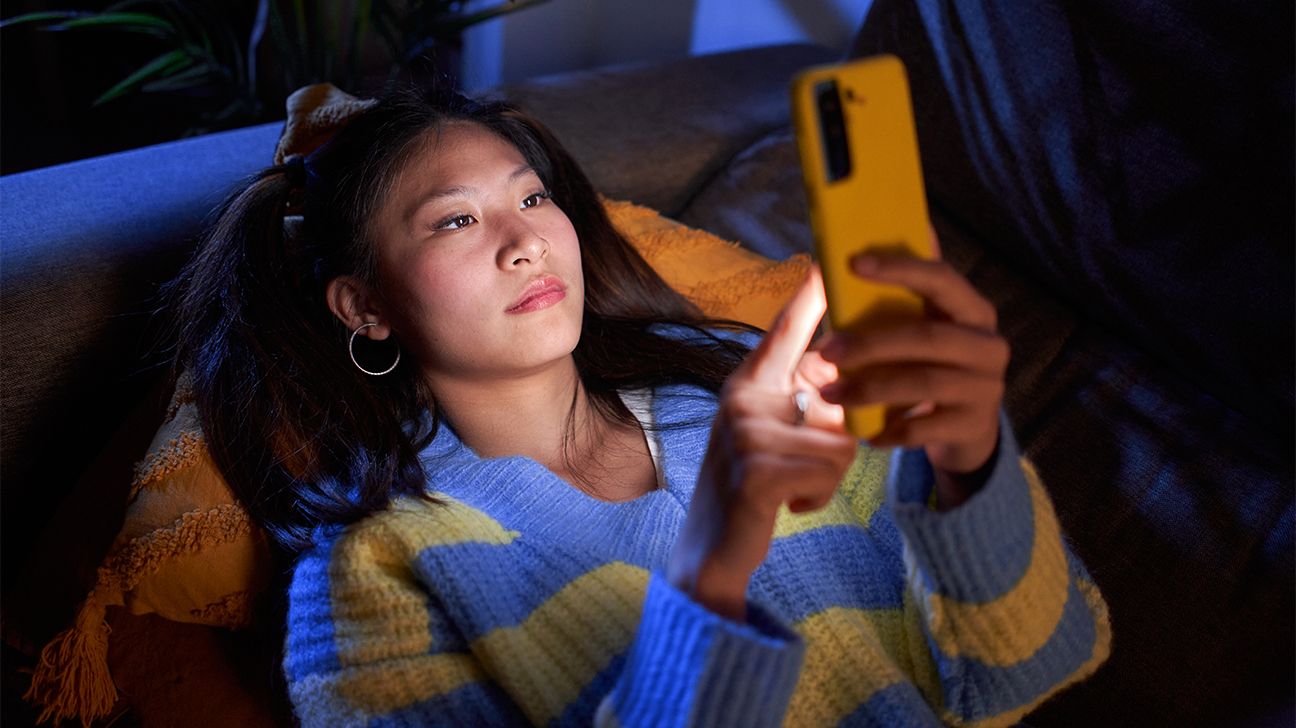Blue light from screens may impact sleep and eye health. However, the effects on the skin remain unclear.
There’s a lot of buzz about whether blue light can strain your eyes. But the question also needs to be asked: Can blue light harm your skin, too? Here’s what the science says.

You’re surrounded by blue light. No, not in a futuristic laser beam from sci-fi flicks kind of way, but because the sun emits blue light. Ever wonder why the sky’s blue? It’s because of blue light.
Blue light is a high-energy, visible light that beams from screens like your smartphone, computer, and TV. It has the shortest wavelengths your eye can detect at around 400–500 nanometers.
UV and blue light are at the same end of the light spectrum but have different wavelengths.
UV light falls in the wavelength range of 100–400 nm. It’s further divided into three bands:
- UVA (315–400 nm)
- UVB (280–315 nm)
- UVC (100–280 nm)
UVA rays are the ultimate long-distance callers. Their long wavelengths penetrate deep into the skin, reaching the dermis — the skin’s thicker, lower layer. UVA has skin-aging effects, conjuring up fine lines, wrinkles, and the leathery look of skin damage.
Then there are UVB rays, which have a shorter wavelength. They hit the skin’s outer layer, the epidermis, where they cause sunburns and play a key role in skin cancer development.
Thanks to the ozone layer, UVC radiation from the sun doesn’t reach the earth’s surface. So, it’s nothing to worry about unless you’re around artificial sources like lamps or lasers.
Blue light can’t cause sunburn but can impact your sleep by messing with your circadian rhythms and causing eye strain. When it comes to skin, the concern with blue light is more about long-term exposure and potential aging, not immediate damage.
Yes and no. Blue light from the sun can cause dark or discolored patches on the skin, a.k.a. hyperpigmentation. It may also cause premature aging, collagen breakdown, and skin barrier dysfunction. Not good news!
When it comes to the blue light from screens, the plot thickens. A 2018 study found that blue light exposure from electronic devices increased damaging reactive oxygen species in human skin cells. In other words, it could age your skin faster.
But then, plot twist: a 2019 study claimed that the amount of blue light from screens is nowhere near enough to trigger skin damage. The authors said you’d have to be glued to a screen 24/7 for a week to match the same level of blue light you’d get from a minute of basking in the sun on a bright day.
So maybe, blue light isn’t as bad for your skin as previously thought. But it’s still not great for your overall health, so remember to take breaks from screens!
If your mantra’s “better safe than sorry,” here are some tips to shield your skin from the blue light:
- Fit blue light filters to your devices. They’re like sunglasses for your screen. You can also use blue light glasses.
- Wear sunscreen with iron oxide. It’s not just for beach days! Some sunscreens can help block blue light.
- Use antioxidant-rich skincare. Ingredients like vitamin C and vitamin E help combat potential blue light damage.
- Limit screen time before bed. Give your skin and eyes a break and enjoy some good old-fashioned book time.
Stay savvy about the impact of screen time on your skin and overall health. The jury’s still out on whether the glow from devices leads folks down a path to early aging.
While waiting for the science to catch up, focusing on healthy screen habits and a solid skincare routine is the best way to keep your skin looking its best. And let’s not forget, the cardinal rule of skincare hasn’t changed — sunscreen is non-negotiable!
